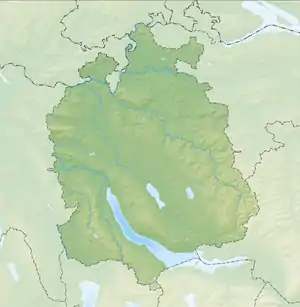Höri | |
|---|---|
 | |
 Coat of arms | |
Location of Höri | |
 Höri  Höri | |
| Coordinates: 47°30′N 8°31′E / 47.500°N 8.517°E | |
| Country | Switzerland |
| Canton | Zurich |
| District | Bülach |
| Area | |
| • Total | 4.79 km2 (1.85 sq mi) |
| Elevation | 412 m (1,352 ft) |
| Population (31 December 2018)[2] | |
| • Total | 2,842 |
| • Density | 590/km2 (1,500/sq mi) |
| Time zone | UTC+01:00 (Central European Time) |
| • Summer (DST) | UTC+02:00 (Central European Summer Time) |
| Postal code(s) | 8181 |
| SFOS number | 0060 |
| Surrounded by | Bachenbülach, Bülach, Hochfelden, Neerach, Niederglatt, Oberglatt |
| Website | www SFSO statistics |
Höri is a municipality in the district of Bülach in the canton of Zürich in Switzerland, and belongs to the Glatt Valley (German: Glattal).
History
Höri is first mentioned in 1149 as Hoerein.[3]
Geography
Höri has an area of 4.8 km2 (1.9 sq mi). Of this area, 59.3% is used for agricultural purposes, while 12.7% is forested. Of the rest of the land, 18% is settled (buildings or roads) and the remainder (10%) is non-productive (rivers, glaciers or mountains).[4]
The municipality straddles the Glatt river with the communities of Ober- and Niederhöri on the western side and Endhöri (earlier known as Ennethöri) on the east.
Demographics
Höri has a population (as of 31 December 2020) of 2,951.[5] As of 2007, 30.1% of the population was made up of foreign nationals. Over the last 10 years the population has grown at a rate of 16.4%. Most of the population (as of 2000) speaks German (76.6%), with Italian being second most common (9.4%) and Albanian being third ( 5.1%).
In the 2007 election the most popular party was the SVP which received 57.8% of the vote. The next three most popular parties were the SPS (14.5%), the CSP (9.9%) and the FDP (6.4%).
The age distribution of the population (as of 2000) is children and teenagers (0–19 years old) make up 25.8% of the population, while adults (20–64 years old) make up 64.4% and seniors (over 64 years old) make up 9.8%. In Höri about 62.6% of the population (between age 25-64) have completed either non-mandatory upper secondary education or additional higher education (either university or a Fachhochschule).
Höri has an unemployment rate of 3.29%. As of 2005, there were 46 people employed in the primary economic sector and about 16 businesses involved in this sector. 502 people are employed in the secondary sector and there are 51 businesses in this sector. 397 people are employed in the tertiary sector, with 80 businesses in this sector.[4]
The historical population is given in the following table:[3]
| year | population |
|---|---|
| 1467 | c. 55 |
| 1634 | 257 |
| 1790 | 355 |
| 1850 | 574 |
| 1900 | 515 |
| 1941 | 471 |
| 1950 | 569 |
| 1970 | 2,103 |
| 2000 | 2,300 |
References
- ↑ "Arealstatistik Standard - Gemeinden nach 4 Hauptbereichen". Federal Statistical Office. Retrieved 13 January 2019.
- ↑ "Ständige Wohnbevölkerung nach Staatsangehörigkeitskategorie Geschlecht und Gemeinde; Provisorische Jahresergebnisse; 2018". Federal Statistical Office. 9 April 2019. Retrieved 11 April 2019.
- 1 2 Höri in German, French and Italian in the online Historical Dictionary of Switzerland.
- 1 2 Swiss Federal Statistical Office Archived 2016-01-05 at the Wayback Machine accessed 29-Jul-2009
- ↑ "Ständige und nichtständige Wohnbevölkerung nach institutionellen Gliederungen, Geburtsort und Staatsangehörigkeit". bfs.admin.ch (in German). Swiss Federal Statistical Office - STAT-TAB. 31 December 2020. Retrieved 21 September 2021.
External links
- Official website (in German)
- Höri in German, French and Italian in the online Historical Dictionary of Switzerland.